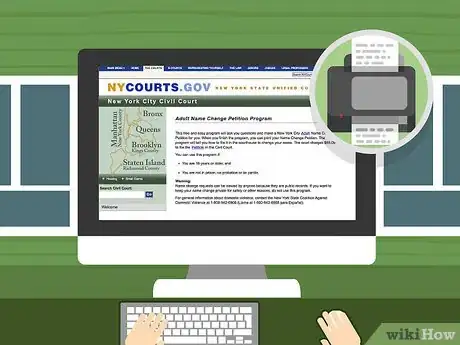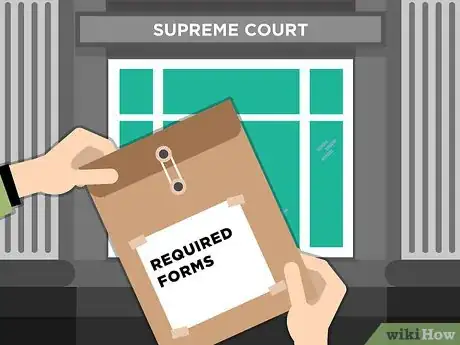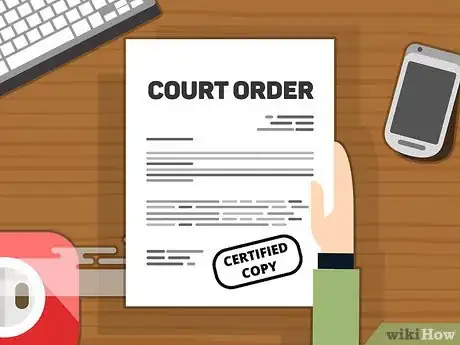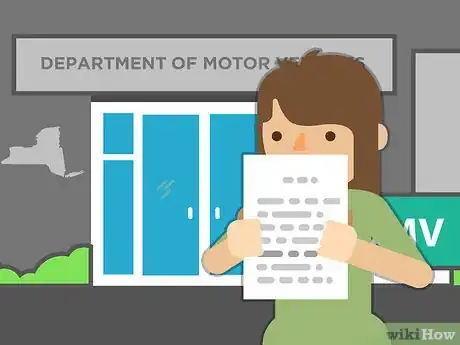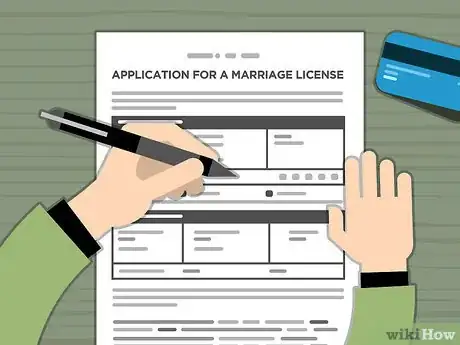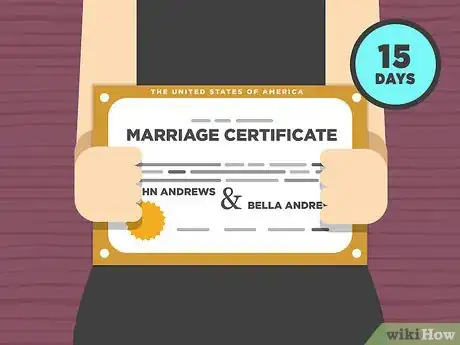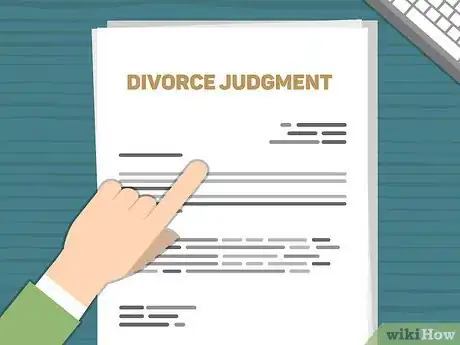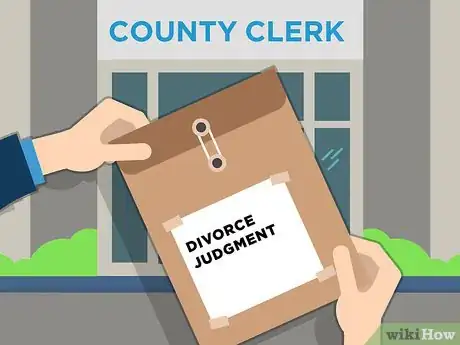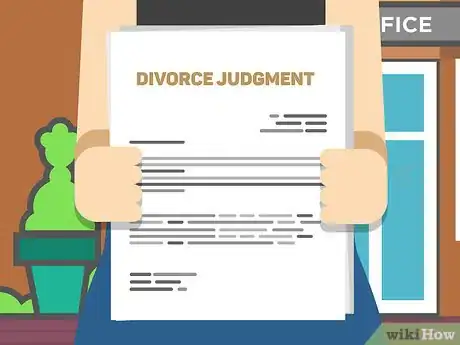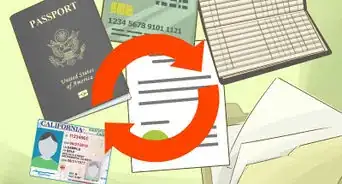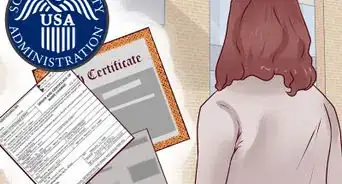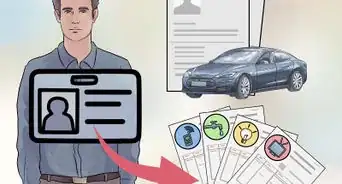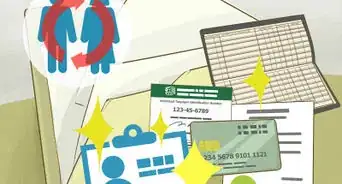This article was co-authored by Clinton M. Sandvick, JD, PhD. Clinton M. Sandvick worked as a civil litigator in California for over 7 years. He received his JD from the University of Wisconsin-Madison in 1998 and his PhD in American History from the University of Oregon in 2013.
There are 14 references cited in this article, which can be found at the bottom of the page.
wikiHow marks an article as reader-approved once it receives enough positive feedback. In this case, 100% of readers who voted found the article helpful, earning it our reader-approved status.
This article has been viewed 111,746 times.
All residents of New York, with the exception of children under the age of 18 and prison inmates, have the right to adopt whatever name they wish. To ensure that government agencies accept your name change, you will generally need a court order that proves you legally changed your name. However, if you are changing your name through marriage or divorce, you can provide evidence of your name change through your marriage certificate or divorce decree.
Steps
Changing Your Name Through A Court Order
-
1Complete a name change petition. To legally change your name or your child's name, you will need to complete and file a name change petition and proposed order. The name change petition can be completed either online or by filling out a hard copy of the form. In either case, keep in mind that you will still need to gather the remaining documents and file the petition in court.
- To complete the name change petition online, visit the following link: http://www.nycourts.gov/courts/nyc/civil/int_adultnamechange.shtml. Click on "Go to the Adult Name Change Petition Program." The program will guide you through a series of questions. [1]
- To fill out the name change petition by hand, pick up a hard copy of the name change petition and proposed order at your nearest courthouse or print out online at https://www.nycourts.gov/courts/nyc/civil/forms.shtml#namechange.[2]
- If you file your case in Supreme Court, you will additionally need to prepare and file a Request for Judicial Intervention to have a judge assigned to your case.[3]
- Respond to all questions on the name change petition, including the reason you wish to change your name or your child's name. You will be asked additional questions, and for supporting documentation, if you or your child has ever been convicted of a crime or bankruptcy, involved in a lawsuit or if you pay child or spousal support.[4]
- Print out the completed form if using the online program. [5]
- Sign in front of a Public Notary.[6]
-
2Gather the remaining paperwork. In addition to obtaining a name change order, proposed order and, if necessary, a Request for Judicial Intervention, you will need to gather the following documents:
- Original or certified copy of birth certificate for you or your child.[7]
- If you are a parent or legal guardian seeking to change your child's name, you will need a notarized consent form signed by any other parent or legal guardian and a separate notarized consent form signed by your child if he is 14 years of age or older.[8]
- If you or your child has a criminal history, you will need a certificate of disposition for each conviction.[9]
- If you or your child is a victim of domestic violence and you wish to avoid the requirement that your name change be published in a newspaper, you will need an Order of Protection or other proof that you suffered domestic violence.[10]
Advertisement -
3File forms and fee. When you have the court papers and other documents ready, you will need to go to the County Court or Supreme Court of the county where you live to file them. You will also need to pay a filing fee. If you live in New York City, file your paperwork and fees with the New York City Civil Court.[11]
- Locate the County Court or Supreme Court nearest you by using the court locator function at http://www.nycourts.gov/courthelp/NameChange/basics.shtml.
- Pay the correct filing fee: $210 for Supreme and County Courts, $65 for New York City Civil Court.[12]
- If you cannot afford the filing fee, file a fee waiver to request that it be waived.[13]
-
4Obtain a photocopy of the court order. Once you have filed the necessary paperwork with the court, a judge will decide whether to approve your petition. If your petition is approved, you will be given a photocopy of a Name Change Order signed by the judge. [14]
- In some cases, a hearing is required to determine whether or not a name change request should be granted. If this is your case, the court will notify you when you need to appear in court.
- If there is no hearing in your case, the order will be sent to you in the mail.
-
5Publish your new name in the local newspaper. If the court approves your petition, you must notify the public by publishing your new name in a local newspaper.
- Contact your local newspaper to arrange for the publication of your new name within 60 days of the issuance of the order. You will need to submit the photocopy of the court order as proof of your name change.[15]
- Obtain proof of publication (Affidavit of Publication) from the newspaper that published your name change and file with the County Clerk or Court Clerk (depending on where you filed your name change petition) within 90 days of the issuance of the order.[16]
- If you miss either the 60 day or 90 day deadline, file a "nunc pro tunc" form with the court, asking the judge to accept your proof of publication despite your failure to comply with the deadline. Include an explanation for why you missed the deadline. [17]
- If you wish to avoid the publication requirement because you believe that publication of your new name could endanger either yourself or your child, explain your reasons in the name change petition filed with the court and ask that the court "seal" the record of your name change.[18]
-
6Obtain a certified copy of the court order. Once you have submitted proof of publication with the court, your name change is complete. At this point, you should request a certified copy of the name change order from the court.[19]
-
7Present your court order as evidence of your name change. A certified copy of your court order will serve as proof that you legally changed your name. However, to ensure that government agencies recognize your name change, you will have to present the order at each agency and request that your name be changed.[20]
- Visit your local Social Security Office Administration to notify them of your name change. This will allow you to use your new name at work so that you can continue receiving credit for all of your earnings. Take a certified copy of your court order and your birth certificate.
- Visit your local DMV office to change your name on your driver's license. Take your current driver's license and a certified copy of your court order.[21]
Changing Your Name Through Marriage
-
1Select the right name. In New York, a person can change only his surname through marriage. To change your first or middle name you must obtain a court order. The new surname must be either:[22]
- The surname of the other spouse or any former surname of either spouse,
- A name combining into a single surname all or a segment of the premarriage surname or any former surname of either spouse or
- A combination name separated by a hyphen, provided that each part of such combination surname is the premarriage surname, or any former surname, of each of the spouses.
-
2Write your new name on your application for a marriage license. A couple who marries in New York must apply for and obtain a marriage license before their marriage ceremony. [23]
- Obtain an application at your nearest clerk's office or online. If you are in New York City, you can fill out the application online by visiting the website for the Office of City Clerk (https://www1.nyc.gov/cityclerkformsonline/). [24]
- In the section of the application titled "Personal Information," indicate you would like to change your name. Then write out your new name in the box below. [25]
- Submit the application in person to your nearest town or city clerk's office. Both applicants must sign the application in the presence of the clerk.[26]
-
3Obtain a certified copy of your marriage certificate. Once your marriage ceremony is complete and the officiant has returned the completed license to the town or city clerk's office, you will receive your marriage certificate in the mail.[27]
- The certificate should arrive within 15 calendar days of the date on which the officiant returns the marriage license to the clerk's office.
- If you have not received the certificate within 4 weeks of your marriage ceremony, contact your local clerk's office.
-
4Present your marriage certificate as evidence of your name change. Your marriage certificate will serve as proof that you legally changed your name. However, to ensure that government agencies recognize your name change, you will have to present the certificate at each agency and request that your name be changed.[28]
- Visit your local Social Security Office Administration to notify them of your name change. This will allow you to use your new name at work so that you can continue receiving credit for all of your earnings. Take your marriage certificate and any identity document that shows proof of your old name.
- Visit your local DMV office to change your name on your driver's license. Take your current driver's license and your marriage certificate.[29]
Changing Your Name Through Divorce
-
1Finalize your divorce. In order to change your name back to your former name or maiden name, a divorce judgment must be entered in your case.
-
2Include a provision in your divorce judgment that authorizes your name change.
- It is standard for a divorce decree to include language granting you the right to use your former or maiden name. Ask your lawyer to include this language in your divorce papers or, if you are not represented, make sure that whatever forms you file to obtain the divorce decree include some language that will allow you to change your name back to your maiden name after your divorce.
- If this provision was left out of your divorce decree, contact the court that handled your case to ask if it is possible to amend the document. If your request is denied, your only option for legally changing your name will be to file a name change petition.[30]
-
3File the divorce judgment with the county clerk's office. This ensures the divorce judgment becomes part of the public record.
- While at the county clerk's office, ask for three certified copies of your divorce judgment. Keep one for your records and save the other two to take to the Social Security Office and DMV.
-
4Present your divorce judgment as evidence of your name change. Your divorce decree will serve as proof that you legally changed your name. However, to ensure that government agencies recognize your name change, you will have to present the decree at each agency and request that your name be changed.
- Visit your local Social Security Office Administration to notify them of your name change. This will allow you to use your new name at work so that you can continue receiving credit for all of your earnings. Take a certified copy of your divorce decree and your birth certificate.
- Visit your local DMV office to change your name on your driver's license. Take your current driver's license and a certified copy of your divorce decree.
References
- ↑ http://www.nycourts.gov/courts/nyc/civil/int_adultnamechange.shtml
- ↑ https://www.nycourts.gov/courts/nyc/civil/namechanges.shtml
- ↑ http://www.nycourts.gov/courthelp/GoingToCourt/RJI.shtml
- ↑ http://www.nycourts.gov/courthelp/NameChange/basics.shtml
- ↑ http://www.nycourts.gov/courts/nyc/civil/int_adultnamechange.shtml
- ↑ http://www.nycourts.gov/courthelp/NameChange/basics.shtml
- ↑ http://www.nycourts.gov/courthelp/NameChange/proof.shtml
- ↑ https://www.nycourts.gov/courts/nyc/civil/namechanges.shtml
- ↑ http://srlp.org/resources/namechange/
- ↑ http://srlp.org/resources/namechange/
- ↑ http://www.nycourts.gov/courthelp/NameChange/basics.shtml
- ↑ http://www.nycourts.gov/courthelp/NameChange/basics.shtml
- ↑ http://www.nycourts.gov/courthelp/GoingToCourt/feeWaiver.shtml
- ↑ http://www.newyorknamechangelaw.com/requirements.asp
- ↑ http://www.newyorknamechangelaw.com/requirements.asp
- ↑ http://www.newyorknamechangelaw.com/requirements.asp
- ↑ http://srlp.org/resources/namechange/
- ↑ http://www.nycourts.gov/courthelp/NameChange/privacy.shtml
- ↑ http://srlp.org/resources/namechange/
- ↑ http://srlp.org/resources/namechange/
- ↑ http://srlp.org/resources/namechange/
- ↑ https://www.health.ny.gov/publications/4210/
- ↑ https://www.health.ny.gov/publications/4210/
- ↑ https://www1.nyc.gov/cityclerkformsonline/
- ↑ https://www1.nyc.gov/cityclerkformsonline/formslist.htm?recordType=MARRIAGE
- ↑ https://www.health.ny.gov/publications/4210/
- ↑ https://www.health.ny.gov/publications/4210/
- ↑ https://www.health.ny.gov/publications/4210/
- ↑ http://dmv.ny.gov/driver-license/changing-name-or-non-address-information
- ↑ https://www.rocketlawyer.com/article/how-to-get-a-legal-name-change-in-new-york-after-divorce.rl
About This Article
To change your name in New York, you’ll need to get a court order. Start by filing a name change petition, which you can do online through the NY Courts website. You’ll also need to gather paperwork to support your petition, such your original birth certificate or a certified copy. Then, you can submit your forms and filing fee with the local County Court or Supreme Court, unless you live in New York City—in which case, you’ll need to file with the New York City Civil Court. For more tips from our Legal co-author, including how to change your name if you marry or get divorced, keep reading!
